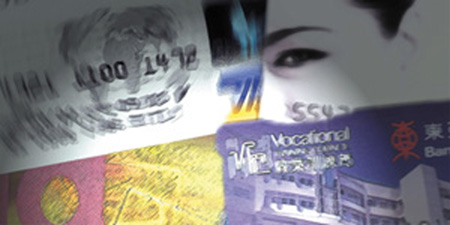
University
credit cards

By Sam Ho
Nice gifts. Discounts. Privileges at designer stores.
. . . University credit cards come with irresistible benefits.
According to a survey by the Democratic Party,
nearly 90 percent of university students have credit cards. Indeed,
they hold an average of 2.3 cards each.
About 85 percent of students got their cards in
their first years, and they used their cards about three times a
month.
Wong Bing Kuen, district councillor in the Democratic
Party, co-ordinated the survey.
The first reason for the popularity of credit
cards is the ease of application.
In general, no proof of financial self-sufficiency
or personal referee is required.
“Second, free gifts and pre-approved credit limit
are given on application.
“Third, the annual fees of cards are usually exempted
for university students,” Mr. Wong said.
Mr. Wong added that credit card bonus point programmes
encouraged card use.
“Payment with cards earns bonus points to redeem
gifts or free services,” he said.
Besides, most credit card holders can get discounts
at designated shops and restaurants.
In addition, it is common for a bank to collaborate
with a university by offering students a commemorative credit card.
For example, Hang Seng Bank offers credit cards
that bear a scene of the Chinese University of Hong Kong exclusively
to that university’s students.
Banks are eager to open up the credit card market
to university students.
Miss Aries Law, spokesperson for Hang Seng Bank,
said university students are important potential customers.
“So we would like to develop a good relationship
with them in advance,” said she.
“Also, they need banking services. Credit cards
are just part of such services.
“Therefore, our university student account service
is designed to help students achieve financial independence and
accommodate their lifestyle.
“It is not to encourage loans, and such an investment
is not risky at all.
“Its success is proven by the prevalence of credit
cards among university students,” added Miss Law.
She said that the number of failed accounts was
small.
Mr. Wong agreed that offering credit cards to university
students is not risky.
“The banks must have done a thorough investigation.
“They would never make a risky investment,” said
he.
He said banks should be responsible for assessing
the students’ financial ability.
“But I don’t think they have taken this responsibility,”
said he.
“Another problem is that banks do not know how
many credit cards a student has.
“So, a student can get many cards, which may mess
up his financial situation,” said he.
According to him, credit companies are supposed
to get relevant information from banks.
But the information is not that useful because
banks are not likely to provide much information on their clients.
He thinks that it is inappropriate to make banks
provide credit card information.
“Hong Kong is a free society,” he said. “Also,
university students are adults. They should be responsible.”
Mr. Wong said that education might reduce the
abuse of credit cards among students.
“University students should learn to manage their
finances properly.
‘‘Courses or seminars on personal finance management
could be arranged,” said he.
Miss Lam Ching Man, a full-time field instructor
in the Department of Social Work at the Chinese University, disagrees.
She said a credit card is a real and psychological
necessity.
“The expenses of university students are greater.
“Having a credit card satisfies their growing sense
of autonomy as adults,” said she.
“Banks encourage students to borrow money to buy
anything they want,” said she. “So, this can lead to the problem
of failed accounts.
“The credit limits of the cards always largely
exceed students’ incomes. This is a pitfall.
“The absence of any connection between banks makes
it easy for students to use another card to pay for a card bill,
thus enlarging their debts.”
Most students are not willing to inform their
parents if they have difficulties in paying credit card bills.
“Young people are reluctant to ask their parents
for help.
“They know that their parents will react negatively
and violently.
“They think that they’ll have to suffer a lot
from their parents before getting out of debt.
‘‘Also, some young people do not want to bring
worries to their parents,’’ said she.
Mary Leung (not her real name) is a Year 2 student
at The Chinese University of Hong Kong.
She refused reveal her name for fear that her
friends and relatives would learn about her indebtedness.
Mary has three credit cards, and she received credit
card bills totalling $16,000 last month.
“I find it impossible to pay the credit card bills
by myself.
“I can’t eat or sleep,’’ she said. “I am afraid
that my parents will never forgive me.”
She changed her mailing address so that her parents
would learn nothing about it.
She decided not to tell her parents for the rest
of her life. In the end, she asked only her brother for help.
Miss Lam suggested some ways to help these clients.
“We usually help them to deal with the bills first.
“Then, we discover the reasons behind impulsive
purchases.
“We also facilitate communication with their parents,”
said she.
“Young people like to be in control of themselves.
When they can’t repay the debt, they may regard themselves useless.
“This ruins their self-image, which is important
for their psychological development,” added Miss Lam. 
|
Views on financial independence
|
Sam Ho
|
|
Students from different universities
were interviewed on how they use their credit cards.
Jacqueline Kam is a Year 3 student
in the Department of Public Administration and Management
at City University of Hong Kong. She uses only one
credit card.
“I think it is convenient,” said
she. “I use it for purchasing and auto-paying my mobile
phone bill.”
Jacqueline said that she told her
family about the card after the application had been
successful.
|
 |
|
Angel Poon says
he does not find credit cards necessary.
|
“My family doesn’t feel good about credit
cards. So, I decided not to tell them beforehand,” said
she.
“I am clear about the lending rate.
“If I can’t pay the debt, I’ll stop the
card immediately and then try my best to get money to pay.
“I won’t bother my family because I have
to be responsible for myself,” Jacqueline said.
Angel Poon Chi Chung, a Year 2 student
studying finance at Hong Kong Baptist University, has no
credit card.
“I don’t think that a credit card is necessary.
An electronic teller card is sufficient.
“Unlike credit cards, the sum I can use
will never exceed my savings,” said he.
Joe Leung is a Year 3 student studying
textiles and clothing at Hong Kong Polytechnic University.
She thinks that credit cards are convenient,
and she has three cards.
“I’m not clear about the charges and lending
rates,” said she.
“If I can’t pay the bill, I’m not going
to inform my family because they’ll get very angry.
“I’ll stop the card and solve the problem
myself,” Miss Leung said.
— Sam Ho
|
|
 Online
Edition
Online
Edition